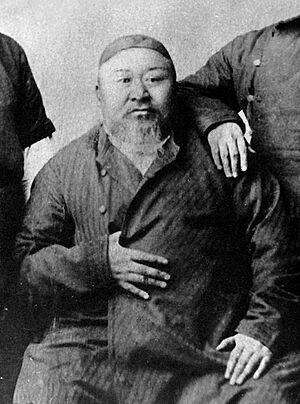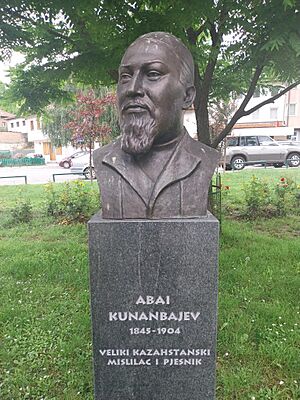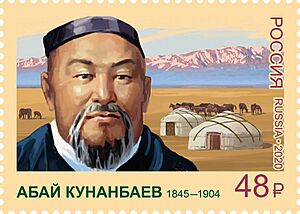Abai Qunanbaiuly facts for kids
Quick facts for kids
Abai Qunanbaiuly
|
|
|---|---|
 |
|
| Born | Abai (Ibrahim) Qunanbaiuly 10 August 1845 Abay District, East Kazakhstan, Russian Empire |
| Died | 6 July 1904 (aged 58) Abay District, East Kazakhstan, Russian Empire |
| Occupation | Aqyn |
| Notable works | The Book of Words |
Ibrahim (Abai) Qunanbaiūly (Kazakh: Ибраһим (Абай) Құнанбайұлы; Russian: Абай Кунанбаев) was a famous Kazakh poet, composer, and thinker. He lived from 1845 to 1904. Abai wanted to bring new ideas from European and Russian cultures to his people. He believed in learning and progress, while still respecting Islamic values. Most Kazakhs simply know him as Abai.
Contents
Early Life and Learning
Abai was born in a village called Karauyl. This area is now part of the East Kazakhstan Region. His father, Qunanbai, was a wealthy man. Abai's mother was Uljan, his father's second wife. His family named him Ibrahim because they were Muslim.
When he was young, Ibrahim went to a local religious school called a madrasah. His teacher was Mullah Ahmed Ryza. During this time, he got the nickname "Abai," which means "careful." This nickname stayed with him for his whole life.
Abai's father was rich enough to send him to a Russian school in Semipalatinsk. There, Abai read books by famous Russian writers like Mikhail Lermontov and Alexander Pushkin. These writers greatly influenced his own writing. He also loved reading old Eastern poems and stories, such as the Shahnameh and One Thousand and One Nights.
What Abai Did
Abai's biggest gift to Kazakh culture was his poetry. His poems showed a strong love for his country and came from the traditional stories and songs of the Kazakh people. Before Abai, most Kazakh poetry was spoken, not written down. This was because the Kazakh people were often nomads, moving from place to place.
During Abai's life, many big changes happened in Kazakhstan. Russian influence grew, which brought more chances for education. People also learned about new ideas from Russia, Europe, and Asia. Abai learned a lot about these new cultures and ways of thinking. His creative poetry helped educated Kazakhs to think about philosophy and religion in new ways.
Abai's Lasting Impact
Many important Kazakh leaders who came after Abai saw him as a great inspiration. Today, Kazakhs think of Abai as one of their first national heroes.
You can see Abai's importance all over Kazakhstan. The Kazakh National Pedagogical University is named after him. One of the main streets in the city of Almaty also carries his name. Many public schools are named after Abai too. He has even been featured on postal stamps in Kazakhstan, the Soviet Union, and India. The city of Abay and the Abai Region are also named after him.
Abai's nephew, Shakarim Qudayberdiuli, was also a historian, philosopher, and poet. He was one of Abai's students.

Statues of Abai have been put up in many cities around the world. These include Beijing, Moscow, New Delhi, Tehran, Berlin, Cairo, Istanbul, Antalya, Kyiv, Tashkent, Sarajevo, Bucharest, and Budapest.
Abai's picture is on the Kazakhstani tenge, which is the money of Kazakhstan. A subway station in Almaty, a street, a square, a theater, and many schools are named after him.
In 1995, the 150th anniversary of Abai's birth, UNESCO celebrated it as the "Year of Abai." A movie about his life, called Abai, was made in 1995. Another Kazakh writer, Mukhtar Auezov, wrote two novels and an opera about Abai.
In 2020, Kazakhstan planned many events to celebrate the 175th anniversary of Abai's birthday. In the same year, a park and a memorial plaque in honor of Abai opened in Antalya, Turkey. In 2021, a square in Istanbul and monuments in Seoul, Berlin, and Paris were opened to honor him. More monuments were unveiled in Atyrau, Tbilisi, Bishkek, New Delhi, and Taldykorgan in 2021, 2022, and 2023.
Abai's Writings
Abai also translated works by Russian and European writers into Kazakh. Many of these were translated for the first time. He translated poems by Mikhail Lermontov, Johann Wolfgang von Goethe, and Lord Byron. He also translated Ivan Krylov's Fables and Alexander Pushkin's Eugene Onegin.
Abai's most important work is The Book of Words (Qara sózderi). This book is a collection of his thoughts and poems. In it, he encouraged his fellow Kazakhs to get an education, learn to read and write, and develop good character. He believed this would help them overcome poverty and corruption. In one part of the book, he talks about how important Russian culture is. He saw it as a way for Kazakhs to learn about the world's cultural treasures.
Moscow Protests in 2012
In May 2012, after some protests in Moscow, people gathered near a statue of Abai Qunanbaiuly. This statue is on Chistoprudny Boulevard in central Moscow. The statue quickly became a meeting point for the protesters. A Russian opposition leader, Alexey Navalny, told his followers to meet there. He called it "a monument to some unknown Kazakh." This made many Kazakhs upset because they respect Abai very much. This event also made Abai's poetry very popular, and it became one of the top downloads on the AppStore.
Images for kids
 | Percy Lavon Julian |
 | Katherine Johnson |
 | George Washington Carver |
 | Annie Easley |





